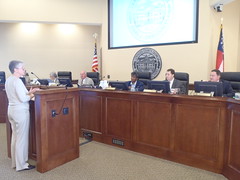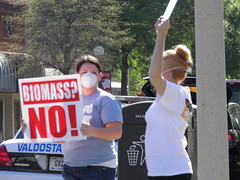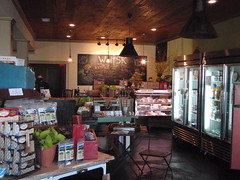Break out the popcorn!
The VDT and the Chamber of Commerce are feuding.
About which one is the most negative!
Also, the Chamber hates agriculture.
And everything good around here is to the Chamber’s credit,
but anything bad is not their fault; just ask them.
The VDT editorialized 18 October 2012,
Is Valdosta really one of the poorest?
mostly criticizing
the recent report that ranked
Valdosta MSA as the third poorest in the country.
The VDT added:
Now that the world wide web has broadcast this story, what can be
done locally to combat this image? And what are the various entities
involved in job and business recruitment, i.e. the Chamber of
Commerce and the Industrial Authority primarily, doing to fix the
underlying problem — low household income and the high
percentage of individuals living below the poverty line.
Valdosta can attract retailers. But can Valdosta step it up and
attract larger industries offering high paying jobs? Has the
community turned away from what made this a successful, viable up
and comer in the state, namely manufacturing and agriculture? These
industries sustained Valdosta for many years and provided good, well
paying, solid blue collar and middle income jobs. Educational
opportunities are far greater today, there are more high school,
tech and college graduates in the area than ever, and blaming the
quality of the work force is starting to lose its luster as a viable
excuse for not bringing in industry. We have the land, we have the
workers, we have the infrastructure and we have a great location
with a good quality of life.
Perhaps the community leadership should focus on the assets that are
already here and less on what’s not. Then maybe the next time a
story like this appears on the Internet, Valdosta won’t be cast in
such a poor light.
The Chamber fired back a broadside to its members, which
I’ve included below here, since I don’t think you can find it online elsewhere.
Here’s the most precious part:
Second, while there is still farmland in Lowndes County, it’s
shrinking and when it sells, it’s for uses at prices that rule out
agricultural use. Agriculture had begun moving to nearby more rural
counties even before the cotton field at the end of Baytree Road
was paved over for Valdosta Mall. Our largest tractor and farm
implement dealers followed.
That’s right, farmland is good for nothing but paving over,
so says the Chamber!
Nevermind that knowledge-based workers generally like
Continue reading →
The Spring 2014 TAG workshop will be held at the City of Douglas Central Square Complex in Douglas, GA (click here for directions) on Thursday, May 29, 2014.





 It’s an opportunity for those of us who are not currently
searching for our next meal to help those who need jobs,
and thereby to help ourselves, so they don’t turn to crime.
Like a burned-over longleaf pine, we can come back from this recession
greener than ever, if we choose wisely.
It’s an opportunity for those of us who are not currently
searching for our next meal to help those who need jobs,
and thereby to help ourselves, so they don’t turn to crime.
Like a burned-over longleaf pine, we can come back from this recession
greener than ever, if we choose wisely.

